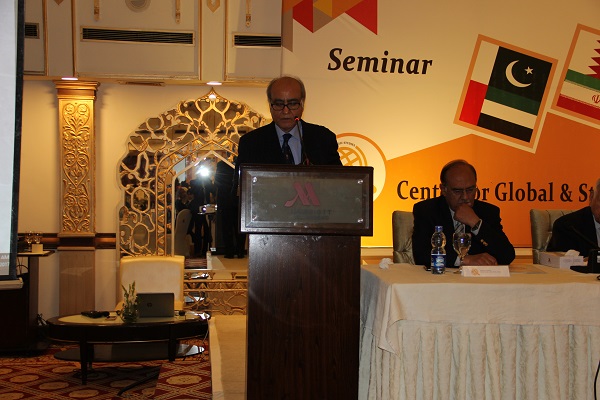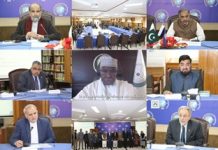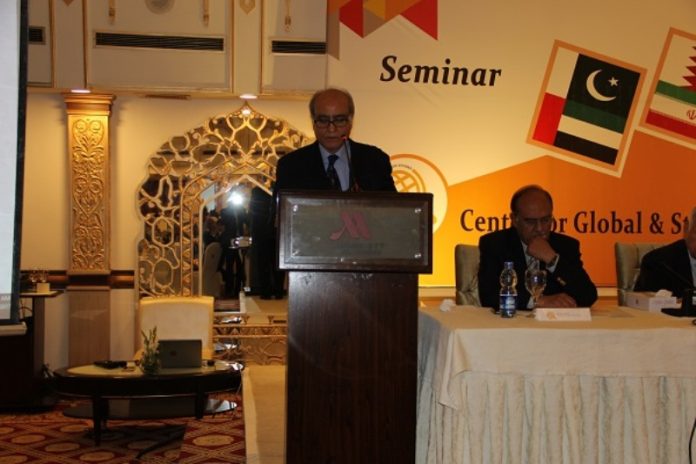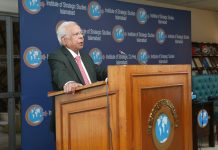PAKISTAN, IRAN & GULF COUNTRIES RELATIONS
Future Challenges and Opportunities for Strategic Collaboration
Centre for Global and Strategic Studies (CGSS) Seminar ( 24 May 2017)

Statement by Ambassador Khalid Mahmood, Chairman and Director General Institute of Strategic Studies, Islamabad (ISSI)
Pakistan, Iran, and the Gulf states are all pearls in the string of shared civilizations, historical experiences, and religious belief. The natural alliances that exist between these countries do not merely stem from theological commonality but also from their cultural and historic ties. However, there is no doubt that there have been fissures. Iran and the Persian Gulf states on account of the differences in their sectarian ideologies, ethnicity, and their competing regional aspirations have had a troubled past.
Pakistan has historically enjoyed cordial fraternal relations with these Muslim countries. They have indeed proven as reliable helpful partners. Pakistan’s foreign policy objectives since its inception, anchored in its Constitution, also commit it to maintain brotherly ties with all Muslim countries. However, a complicating factor has been intra-Arab and Iran-Arab rivalry and competition, compounded by foreign interference and intervention. They are now pitted against each other in Syria, Yemen, and Iraq as well as in Bahrain. Pakistan’s geostrategic affinity with these countries makes it a plausible link between the two sides.
Pakistan shares with Iran geographical border and bonds of common faith, culture, and history. The brotherly ties between Pakistan and Iran predate the creation of Pakistan. In the pre-partition days, the Muslim League had mobilized relief assistance for the earthquake victims in the Iranian Seistan- Baluchistan. And the Muslim League under the Quaid-e- Azam had passed a resolution demanding of the Soviet Union to withdraw from the Iranian territories it had occupied. The ties of mutual love and friendship had deepened after Pakistan gained independence. Iran was the first country to recognize independent Pakistan and Pakistan was the first country that recognized the Islamic revolution of Iran in 1979. Iran’s ready support to Pakistan in its difficult times, particularly during the 1965 and 1971 wars and after natural disasters, is etched in the memory of Pakistani nation. Among other things, they together with Turkey established RCD and its successor ECO, besides coordinating their policies in the framework of OIC, NAM and the UN system.
Of course there have been difficult phases too causing strains in their mutual relations, but generally, it has been a bond of brotherhood informed by mutual trust, compassion and confidence. In my long diplomatic career, particularly during my Ambassadorial tenure in Tehran from 1994 to 1997, I personally witnessed the ebb and flow in this important relationship.
My stint in Iran, unfortunately, coincided with a rough patch in our bilateral relations. For one, this period saw the rise of the Taliban which, in spite of our two countries’ common goal of promoting peace and stability in Afghanistan, pitted Pakistan and Iran on the opposing sides. Then there have been intermittent bloody sectarian incidents in Pakistan in which, among others, an Iranian diplomat and a number of cadets lost their lives. The border across Baluchistan was as disturbed as now. And our bonhomie with the United States starkly contrasted with the running bitter antagonistic Iran-US relations. This state of affairs naturally put severe strains on Pak Iran-relationship. It is a shining testimony to the resilience of the unbreakable bond between our two countries that their bilateral ties survived this violent buffeting.
How does the present situation differ from the mid -1990s. The ouster of Taliban in Afghanistan removed the main divisive issue. Henceforth, Pakistan and Iran were to jointly and in harmony, to work for peace, stability, and prosperity of Afghanistan. We have to be watchful of the size, nature, and purpose of the continued, albeit limited, US presence in Afghanistan and to ensure that no other country tries to gain an advantage there to our detriment.
The triple bane of militancy, terrorism and sectarian violence regrettably continues to stalk the region. However in the recurring unfortunate violent incidents in Pakistan while the sectarian overtones cannot be totally excluded they are more acts of terrorism.. Pakistan would continue to need the cooperation of Iran and rest of the international community in countering this challenge.
The situation across the border in Baluchistan, as I stated before, remains disturbed. Iran’s resort to mortar shelling and the threat of military strikes across the border is indeed very unfortunate. The situation, in fact, calls for intensified cooperation between Pakistan and Iran on security related issues under the existing mechanisms of the Joint Ministerial Commission, Special Security Committee, and the Joint Border Commission. The same goes for our two countries efforts, in collaboration with Afghanistan, to counter rampant drug smuggling.
For well-known reasons, Pakistan and Iran’s relations with the United States have followed different trajectories. However, Pakistan has never become a party to any US designs against Iran. It cannot think of ever doing so. The position adopted by Pakistan in the Board of Governors of the International Atomic Energy Agency(IAEA) on Iran’s nuclear programme stands in contrast to the pro- US stance, say of India. The US naively thinks that its aggressive actions against Iran will have no fallout in Pakistan. No matter what the state of Pakistan-Iran relationship, any military attack against Iran will be seen as a precursor to an attack against Pakistan’s strategic assets.
In the best of times, even when there were no factors militating against the development of close Pak –Iran ties, bilateral trade, and economic cooperation have mostly lagged behind their strong mutual political and strategic cooperation. The imposition of UN and US-European sanctions against Iran, particularly those targeting Iranian banks and its energy sector, had aggravated the situation. Joint Trade Commission and the Border Trade Committee need to expeditiously find solution to the impediments in the way.
Similarly, several mega projects like Iran-Pakistan Gas Pipeline, Taftan- Quetta Transmission Line, Noushki-Dalbandin sector of Quetta –Taftan National Highway, Upgradation of Quetta –Taftan Railway Line and increased Import of electricity from Iran are moving rather slowly.
In the context of Economic Cooperation Organization ( ECO), Pakistan and Iran along with Turkey, as founding members of ECO, should strive to make the Organization more relevant, effective and visible. The recommendations made in this regard by the Eminent Persons Group, on which I have had the honour to serve, merit urgent attention and support.
Iran-Pakistan gas pipeline project right now is perhaps the most important issue in the field of bilateral economic cooperation. This project is in the mutual interest of the two countries. According to the agreement signed between Pakistan and Iran, we were supposed to have completed the pipeline on our side by December 2014 so as to start the import of Iranian gas, failing which we would have to pay a hefty penalty. This has not been possible because of financial constraints and the American sanctions on Iran. Following the nuclear deal between Iran and the West, hopes have been raised regarding the early realization of the gas pipeline project. The US has, however, conveyed that there is no change in its policy towards the pipeline project.
Likewise, Pakistan has always enjoyed fraternal relations with all Gulf Arab nations. Saudi Arabia, in particular is the closest ally of Pakistan. Their bilateral relationship is marked by a high degree of trust and brotherhood. There is no contentious issue between them. It is hard to recall any occasion when they differed on a regional or international issue. The reverence it evokes being the host of Harmain Al Sharifain apart, Saudi Arabia has been a generous supporter of Pakistan in bailing it out during its financial woes. I recall from personal experience the oil facility it readily provided following the imposition of sanctions in the wake of 1998 nuclear tests by Pakistan. Saudi Arabia is also among the 15 top export partners of Pakistan with which bilateral trade volume has gone above US$ 4 billion per annum and is likely to be further increased in the years to come. Currently, more than 2.2 million Pakistanis are gainfully employed in Saudi Arabia, a source of much needed foreign remittances. Saudi Arabia has always supported Pakistan on the issue of Jammu and Kashmir and encouraged Pakistan and India to initiate confidence building measures. The Islamic Military Alliance that Pakistan has recently agreed to join and lead has also been conceived by Saudi Arabia while other countries of the region have promptly joined it to fight the common peril of terrorism. With other Gulf States like UAE, Kuwait, Oman and Bahrain, we equally enjoy deep fraternal ties. A considerable number of skilled workforce from Pakistan resides in these countries, supplementing our foreign exchange reserves.
From the above, it is evident that both Iran and Saudi Arabia are Pakistan’s close brotherly Islamic states. However, with Iran, occasionally strategic differences do arise. Moreover, while Saudi Arabia has normal ties with India, Iran has a wide-ranging close relationship with India which sometimes does constrict its relationship with Pakistan.
As the Arab states and Iran have had a troubled relationship, the affinity that both these sides enjoy with Pakistan is one of the few points of commonality between them. The diverse religious community in Pakistan enjoys abiding feelings of affection for all these countries alike. It is important for Pakistan to encourage these brotherly countries to resolve their differences amicably as their mutual rivalry is detrimental for the Islamic Ummah, especially Pakistan.
In this context, the subject of Pakistan’s leading role in the newly formed Islamic Military Alliance (IMA) of which Iran is not a member, is also being projected as a point of dissent between Pakistan and Iran. The recently held Arab-Islamic- American Summit in Riyadh has aggravated the situation adding to the tension, division, and mistrust already afflicting the Muslim world. Although it was not a meeting of the Alliance, the Summit’s outcome does impinge upon the as yet inchoate Islamic Military Alliance. Turning the Islamic Alliance set up to counter terrorism into an instrumentality whose objective is to isolate Iran will only dilute and weaken its proclaimed purpose. That this should be happening at a time when Iran has reelected a moderate President who believes in reaching out to the world and who was responsible for the nuclear deal with 5+1 world powers is beyond comprehension. Pakistan, along with other like-minded member states should resist such undesired transformation of the Alliance. On the other hand, Iran needs to be reassured thatPakistan would not allow its friendship with other countries in the Persian Gulf region to come in the way of the development of friendly relations with Iran. In my view, Iran should take comfort in the fact that the Alliance includes Pakistan and that it will be headed by a Pakistani General and not one from some other country. This assures that the Alliance cannot possibly be used against Iran; Its focus will remain on countering terrorism.
The Middle East has faced significant power struggle all along. The policies of the major powers have failed to bear any fruit. Be it the conflict and bloodshed raging in Syria and Iraq, refugee exodus or the war in Yemen, not to speak of the Palestine issue crying for an early just solution, the policies of the United States and its allies have proven to be counterproductive. It is imperative that the regional countries along with allies with suitably aligned interests such as Pakistan attempt to resolve their issues by themselves assuming the roles of major stakeholders. For this purpose, with the help of platforms such as the Gulf Cooperation Council (GCC) and OIC, the Gulf States and Iran can amicably address issues of joint regional significance.
All is not grim, bereft of any hope. A phenomenon taking the world by storm is the wave of regional economic connectivity being spearheaded by China through the ‘Belt and Road Initiative’ of which Pakistan is a major participant. Through its flagship project of the China-Pakistan Economic Corridor (CPEC), Pakistan is poised to rapidly becoming a hub of economic activity in the region. China is the top trading partner to half the Gulf States, as well as to Iran in the current fiscal year (2016-17). Iran among other regional countries has been encouraged by Pakistan and China to join the project which offers mutually lucrative prospects for all its participants. Similarly, the Arab states of the Gulf with their robust energy resources can likewise complement this mega initiative. Thus, there are innumerable prospects for the cultivation of better cooperative economic ties among the Gulf States, Iran, Pakistan, and China. This development driven nexus offers a better alternative to the security-centered drive pushed at the Riyadh Summit.
The Greater Middle East comprising the Arab world and Afghanistan, Pakistan and Iran is gripped with conflict, foreign intervention, extremism, terrorism, and Islamophobia as well as sectarian and ethnic schisms. The situation demands that countries search for common ground. Pakistan due to its proven expertise and experience in successfully fighting terrorism is an asset to its brotherly nations of the Gulf and Iran. It is imperative that we sink our differences and unite in the face of our common challenges.














